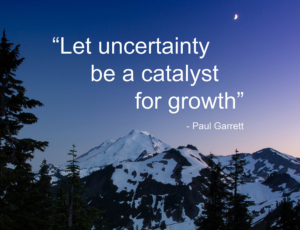Altimeter Group founder Charlene Li and I recently published a report that documented the 6 Stages of Social Business Transformation. In the process, we discovered the most common mistakes and successes businesses experienced along their journey. What was most surprising however, not really, was the cavernous disconnect between social media strategy and overall business objectives.
– Only 34% of businesses feel that their social strategy is connected to business outcomes.
– Just 28% of companies we studied feel that they have a holistic approach to social media, where lines of business and business functions work together under a common vision.
– Only half said that top executives were “informed, engaged and aligned with their companies’ social strategy.”
The report was written to help strategists bridge the gap by understanding where they are, where they want to be, and how to get there efficiently. Charlene and I also observed that the most elite companies among those we studied shared seven success factors in their social business strategy. Rather than publish a follow up report, we experimented with an ebook format. The result is a 100 page resource guide that will help you expedite and enhance your path to transformation.
As we were preparing for launch, our publishers, Josie Bass, asked an important question upon release of the ebook, “what does it really mean to be a social business and why is it important?” From there, it lead to an in-depth conversation where we answered a total of five questions designed to help you push forward when others push back.
Remember, persistence overcomes resistance…as long as it’s informed and inspired.
What does it mean to be a social business?
A social business is more than social media and the Likes of Facebook, Twitter, Pinterest, et al. Yet, it’s a term that’s often confused with social media strategy. There’s an important difference between a social business and a social media strategy.
Each represent distinct qualities for which “social” is simply a qualifier. In front of media, social is an adjective that describes the nature of channels, networks, or platforms that facilitate conversations online. When placed ahead of business, social articulates a philosophy or approach.
In this case, “social business” is a philosophy, a way of business in which social technologies supported by new approaches facilitate a more open, engaged, and collaborative foundation for how we work.
How do you convince companies to see social media as more than just, “a necessary nuisance?”
The fact that social media and social business still cause debate or even confusion after all these years is understandable. Many executives see social media as a novelty or a distraction for young adults and kids. They haven’t realized the impact of social networks because they either don’t have time, can’t see the value, find it difficult to keep up with all of the networks, or a combination of all of the above.
Coming back to the differences between social media and social business, it’s important for any social media or digital strategist to learn the language of the C-Suite. In this ebook, we share insights from several top executives to understand what it takes to convince them of the true opportunity that social business promises. We’ve heard time and time again that their priority and focus is driving business objectives, creating opportunities, and solving problems. They don’t make decisions based on technology or trends, yet strategists tend to emphasize social media rather than business goals.
A social media strategy outlines how a business will employ social networks to engage customers or employees.
A social business strategy starts with a vision for how social media will improve customer and employee experiences and relationships and therefore aligns social media initiatives with business goals and opportunities. Technology thus becomes an enabler for a bigger mission and purpose.
Executives asked that we consider a day in their life. They report to stakeholders and sometimes shareholders. They are measured on business performance. If you do your homework to understand their priorities and align social with their business objectives, you’ll earn their attention. Add to that customer expectations, preferences, and the opportunities and challenges with each and how you can help solve against them. By presenting social in this light, executives can’t help but at least support further research and ultimately pilot programs that lead to bigger initiatives.
In the end, you learn that a true social business strategy employs social as one of the primary channels, not the only channel, to deliver a consistent, connected, and additive experience online, through mobile and in the real world by modernizing and improving the complete customer and employee lifecycle.
What are some criteria that organizations should use to prioritize their social initiatives?
As mentioned earlier, social media strategies are often sparked by technology or trends. I’ve heard strategists focus on Pinterest because of its popularity, not necessarily because there was a clear correlation between Pinterest users, behavior, and business opportunities. This is also true for most popular or emergent platforms.
When you begin with business objectives, social technology and the communities they reach are evaluated against bona fide priorities that already have the buy-in of executives. In this case, we look at business pillars to assess the criteria that contribute to the success of any organization, which can include sales, employee and customer satisfaction, brand resonance, NPS, etc. These pillars represent the primary measures for assessing value in the social business strategy process.
For example, each initiative should be assessed at the functional, line of business, or brand level. From there, ideas must tie value to the organization (business goals) and also consider the team’s ability to execute. Evaluating ideas this way helps prioritize opportunities while uncovering needs, training, support or assets required to properly execute.
How important is it to get the C-suite on board with social business strategy?
In our research, we learned that as social media permeates the enterprise, it typically does so from the marketing or communications department. Usually a social media champion rallies adoption within the organization. As social becomes more prevalent in society, more champions arise throughout the company, seeing it as an opportunity to improve how they do things today. As it gains momentum, it creates an internal groundswell that eventually requires budget, resources, training, and governance to support expansion and introduce enterprise-wide standards and goals.
At this point, social usually hits a ceiling that requires executive sponsorship to truly transform how a company views social’s potential. Anyone experienced in change management will understand that systemic transformation occurs from the top-down. Earning buy-in, making the case, tying strategies to business objectives, learning the language of the C-Suite – this is how strategists can earn support and bring about the change they wish to see. This is true for more than social media of course. But in that regard, getting the C-Suite on board is imperative to launching productive social business initiatives.
Why do you recommend a three-year plan? Is that realistic, considering the rate of technology change?
If there’s one thing we can bet on, it’s that change is not only necessary, it’s slow to appreciate and ultimately unfold. A three-year plan is far enough out to plot a course for transformation but also tangible in the sense that real programs can be deployed now and over time to the benefit of customers, employees and the bottom line.
Remember, social business isn’t about technology; it’s about attaining goals and objectives by improving relationships, driving transactions, and enhancing experiences through channels of relevance. Technology and channels will always evolve and as such, they become enablers for a higher purpose. This is about the ongoing pursuit of relevance.
Click the cover for more information on the ebook and also how Altimeter Group can help:
Connect with me: Twitter | LinkedIn | Facebook | Google+ |Youtube | Instagram






you said: “yet strategists tend to emphasize social media rather than business goals.”
and that to me is the CRUX of the problem: Strategy ain’t strategy if it doesn’t address business goals.
Amen.
<– trying not to get too excited that THE Strategy master himself agreed with my comment! But seriously your presentation at Social Fresh West was one of my favorites by far. I am furiously reading your materials and ordered your books. You have that magical farsight strategic touch Brian. Thanks for rocking it.
Thank you Andy. Really appreciate it. Great question at the conference btw!
I think the most difficult stage is to convince people for getting involved in social media marketing, the plan must be shared with the masses if requires supported by numbers so that clear cut impact can be gauged and efforts can be directed to achieve the objective of social media marketing.
Hey, Brian. In my most cynical moments I fear that companies are giving up on social business because it didn’t live up to the overhyped promises, and/or that they never staffed for or gave priority to. What are you seeing? Are more companies adopting and embracing social business fundamentals, or are you seeing a backlash with companies defunding, destaffing and de-emphasizing? Or are we just avoiding the whole issue now and focusing on content marketing? (Which, by the way, has always been a huge part of the social business equation.)
Hey briansolis, do you remember that game Kachinko? this is how I would illustrate a parallel between the strong disconnect between many businesses today in their view and application of social business. It’s very haphazard, inefficient and unpredictable. Unfortunately many aren’t positioning their strategy with their business goals and one can see that by the digital marketing campaigns that are activated.
Experienced ‘Experiential Architects’ will understand the Kachinko effect and it’s randomness (high risk and loosely controlled) of results, towards the experience that is ergonomically designed at a meta level which is more aligned to a “choose your own adventure” template. It’s malleable, it’s measurable and more organic. More playdoh than funnel. Clear vision, purpose, empathy (outside in thinking), flexibility of mind and beautiful design helps. The tools of social media are as you say, enablers. The means to the ends. Definitely not the end.
Less obsession with shiny objects and metrics. Knowing our audience, contextualising their data/information to act on what we actually know/discover. The winners in my view will be those businesses that understand and implement “The Never Ending Story” 🙂
Thanks for the mindfood. Always.
Mahei
Brilliant Mahei…
thanks Brian 😉
Brian, I know one of the biggest problems with social media
marketing is making it quantitative and showing how it actually helps
businesses. Your article brings about some great points and introduces me to
this ‘social business’ aspect. I see that social is more than just a fad that
can be looked over by those higher up in the company. For a business to be successful,
the must truly become a ‘social business.’ They have to connect to the people
out there and create a two-way channel of communication. I agree that many
companies do not understand the importance or they don’t want to take their
time to understand social. As part of a younger generation coming up through a
business college, I believe that social will continue to play a bigger role in
marketing and business in general as our generation moves into positions of
power and employment of these companies.
Thanks for taking
time for sharing this article, it was excellent and very informative it’s my
first time that I visit here i found a lot of informative stuff in your article
keep it up thank you.
href=http://www.webtechart.com”
SEO
Training Center In Karachi
I’ve gain more
knowledge and good information from your post thanks.
href=http://www.webtechart.com”
SEO
Training Center In Karachi
Well said, The key is relevancy. I will make sure to share. This is a very interesting article. Thanks !